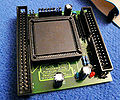Difference between revisions of "CPC-IDE"
(→Technical) |
(→Technical) |
||
| Line 13: | Line 13: | ||
== Technical == | == Technical == | ||
| − | The CPC-IDE interface uses port & | + | The CPC-IDE interface uses port &FD06-&FD0F by default, but you can select the upper 8 bits with the jumpers on the board. The I/O Ports are compatible with the [[SYMBiFACE II:IDE registers]]. |
| − | + | ||
| − | The | + | |
== Pictures == | == Pictures == | ||
Revision as of 00:23, 22 February 2010
CPC-IDE is some kind of a prototype, the project was discontinued / replaced by SYMBiFACE II.
History
In Autumn 2004 the CPC-IDE was developed by Dr.Zed with support from Octoate, Tolkin and TFM. It was the first hardware solution ever that allowed connection of IDE harddrives and CF cards to the CPC. Technically the CPC-IDE interface was based on the GIDE IDE interface by Tilmann Reh.
It was fully working, but still in a prototype state, so only 10 pieces have been produced.
During the production of the CPC-IDE Prodatron joined the team and created IDE-support in SymbOS for FAT16 and FAT32 hard discs by Xmas 2004.
After getting it working successfully, Dr.Zed and Prodatron made plans for a second version, which includes a lot of more extensions. So the SYMBiFACE II is not now merely an IDE interface. It merges the CPC with current PC technology.
Technical
The CPC-IDE interface uses port &FD06-&FD0F by default, but you can select the upper 8 bits with the jumpers on the board. The I/O Ports are compatible with the SYMBiFACE II:IDE registers.
Pictures
- Images of the CPC-IDE prototype

